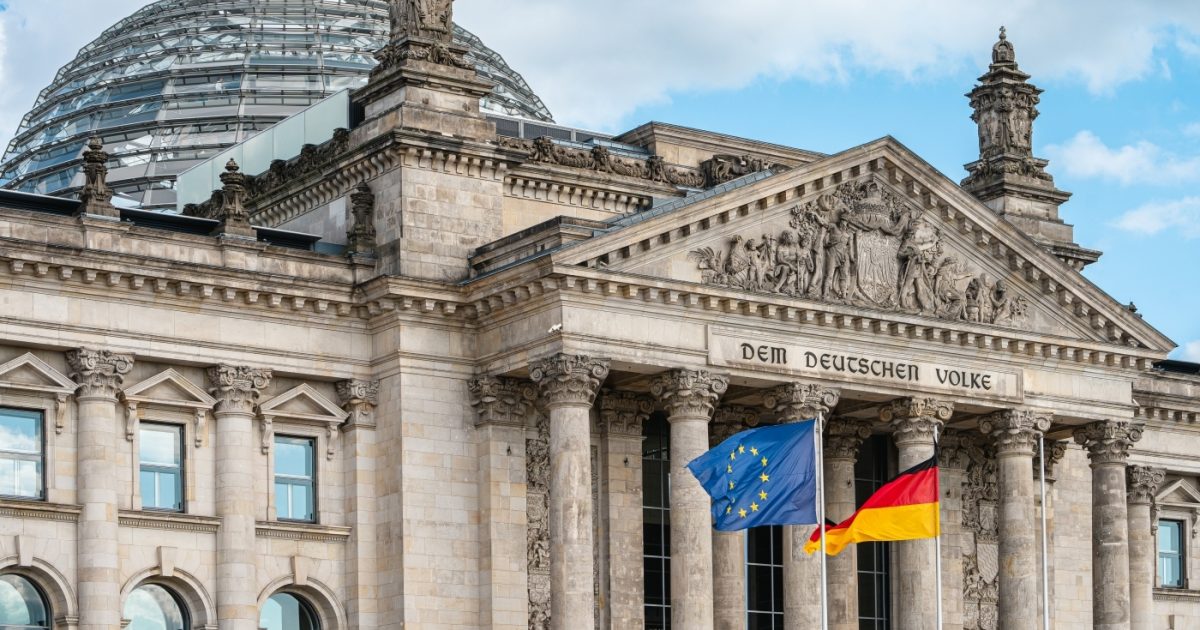In Germany, a centre-left government found itself hamstrung by strict borrowing rules
This month, Labour abandoned its pledge to invest £28bn in carbon-busting measures like home insulations, wind and solar energy, and clean steel manufacturing. Rachel Reeves and Keir Starmer blamed this decision on the cost of government borrowing and the state of the UK economy. Next week we are likely to see Labour respond to the government spring budget with similar language.
The Labour leadership are desperately keen to present Labour as economically responsible. But if Labour, as current polling suggests, form the UK’s next government, what will happen when they are hamstrung by their own borrowing and debt rules? The party would do well to look over to Germany, to see how they may box themselves into a corner if they come to power.
In 2021, after 16 years of conservative rule, the Social Democrats (SPD), Greens and the liberal Free Democratic Party (FDP) formed a centre-left coalition government in Germany, headed by chancellor Olaf Scholtz. This coalition promised a blend of social justice, environmental action, and support for German industry. Like the UK Labour Party, they also promised fiscal discipline — meaning restrictions on government borrowing and spending.
Fast forward three years, and the German government coalition parties, particularly the SPD and FDP have dropped significantly in the polls. The far-right Alternative for Germany (AfD) has surged, now polling at 20%.
Germany’s strict “fiscal rules” played a role in this. Back in 2009, Angela Merkel’s government enshrined excessively strict borrowing and spending limits in the German constitution, intended to prevent government debt payments from becoming unaffordable.
Olaf Scholz’ coalition aimed to circumvent these borrowing and spending rules by raising government money through “special funds” outside the main budget. But in 2024, these were blocked by the constitutional court, leading to coalition parties cutting the government budgets. The FDP party continues to block attempts to reform these fiscal rules or introduce a wealth tax to raise government revenues.
The impact on the German economy has been damaging. For decades, the German government has underinvested in digitalisation, education, health, trains and climate action. This has meant daily services that people depend on have suffered. Underinvestment has led to the productive capacity of Germany being weakened. The things which make an economy stronger — education, health, mobility and innovation — have been neglected.
“For decades, the German government has underinvested in digitalisation, education, health, trains and climate action. This has meant daily services that people depend on have suffered.”
It is also becoming clear that too little public and private investment is harming German industry. The German economy greatly depends on exporting manufactured goods, particularly to China and the US. But exports to China have declined, and the Chinese government plans to manufacture its own advanced industrial goods to become more self-sufficient. Meanwhile, the US is investing huge amounts of public money in its domestic industries. If German industry is to compete globally and embrace future-proof industries like renewables, heat pumps and semi-conductors, the government needs a different approach to public finance.
Today, even industry is making this case. 54 major German multinational companies stated that failure to move to a low-carbon economy has made the climate crisis, energy crisis and cost of living crisis worse. They called on the German government to safeguard Germany’s “economic survival” by pursuing a low-carbon economy and making sure low-income households are supported, which would require changing the rules governing Germany’s borrowing and spending.
Right now, the German economy is in recession, public services are crumbling, trains delayed and investments in slashing carbon emissions have slowed (UK reader: does this sound familiar?). This is contributing to many German people feeling insecure, powerless, and mistrustful of their government.
Studies have found that austerity measures lead to rising political distrust, which contributes to increased support for extremist parties. While the growing popularity of the AfD can not solely be attributed to underinvestment in essential sectors over the last decade, underperforming public services foster an environment where far-right beliefs can take hold. It seems particularly problematic when progressive parties, who promise “progress”, implement arbitrary fiscal limits that undermine the very objectives they set out.
The ongoing ‘polycrisis,’ marked by ecological catastrophes, the conflict in Ukraine and the high cost of living, will persist in Germany without a boost to public investment. But this requires a government willing to state that fiscal rules are political choices — not objective economic truths.
Instead of abandoning its pledge for massive investment in the green industries of the future, the UK Labour Party should have drawn lessons from the experience of the centre-left coalition in Germany. The right kind of public investment, particularly in green sectors like renewables, home insulation or green manufacturing, would boost the UK economy, create thousands of quality jobs, while kicking the UK’s addiction to expensive fossil fuels. Abandoning crucial green investments now is likely to make British people poorer and our economy weaker. Combined with the cost of future climate disasters, refusing to borrow now would lead to more unsustainable debt levels in the future. Watering down climate plans is also unpopular. Recent polling found that Labour ditching climate policies could lose them a significant number of voters.
Any political party does not just need to win an election — it also needs to ensure the long-term viability of its political project. Fulfilling promises for a “decade of national renewal” and “speeding ahead of climate” hinges on Labour committing to serious, sensible public investment. But right now, our fiscal rules are a political straightjacket that progressive projects get caught in time and time again.
Image: iStock


